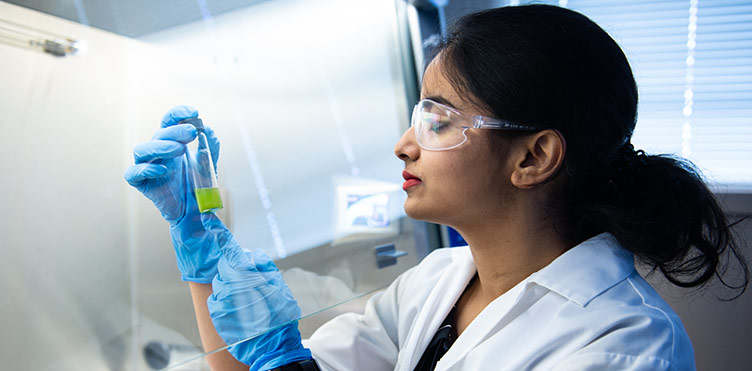Biology
Fredericton campus

- Degrees offered: MSc & PhD
- Application deadline: Open
- Study options: Thesis
- Length: 2(MSc) / 4 (PhD) Years
- Entry terms: Fall, Winter, Summer
Our degrees are centered on the development and performance of an original research project, ranging from the molecular level through a broad range of interests in organismal biology to ecology and evolutionary biology.
Graduates from our program now work in various fields of biology as laboratory or field technicians, scientific consultants and analysts, research scientists and teaching professors or research professors in academia.
Research centres, facilities and collaborators
The Canadian Rivers Institute (CRI), Stable Isotopes in Nature Laboratory (SINLAB), Centre of Environmental and Molecular Algae Research, Connell Memorial Herbarium, ultracentrifuges, microscopy facilities, cell fractionators, fish culture rooms, stable isotope facility, growth chambers, biohazard containment facilities and a greenhouse complex located on the roof.
We are associated with such organizations as NB Co-operative Fish & Wildlife Research, Natural Resources Canada, Hugh John Flemming Forest Research Centre, Agriculture Canada Research Station, Mactaquac Fish Hatchery, Huntsman Marine Science Centre and St. Andrews Biological Station.
We typically have 25-30 active MSc and 25-30 active PhD students at any given time. Our graduate students work hand in hand with faculty members on original research projects.
Current faculty and research areas
Jason Addison - Population genetics and speciation in marine and freshwater invertebrates
Alexa Alexander -Truskiak - Combined effects of multiple natural and anthropogenic gradients on aquatic community assembly, diversity, and resilience
Donald Baird - Aquatic Ecology, focuses on the study of how environmental stressors interact to pose a threat to the biodiversity of aquatic ecosystems
Myriam Barbeau - Coastal marine ecology; population and community ecology; invertebrate zoology; applied ecology (ecological modelling, restoration, and aquaculture)
Katherine Barclay - Control of myocardial blood flow and the effects on the circulatory system of changes in cardiovascular properties through disease or drugs
Tillmann Benfey - Fish physiology and aquaculture
Bryan Crawford - Basic Cell and Molecular Biology, Zoology, Cell-ECM interactions, Matrix Metalloproteinases
Allen Curry - Fish Ecology and population dynamics
Les Cwynar - Arctic-boreal plant ecology and paleoecology
Mike Duffy - Parasitology, Acquired Immunity, Epidemiology, Zoonotic Pathogens, Wildlife Diseases, Diagnostics Methods, Molecular Biology, Immunology, Invertebrate Zoology
Dion Durnford - Chloroplast-nucleus signal transduction pathways; photosynthetic acclimation to environmental stress
Tim Erickson - Sensory neurobiology, animal behaviour, mechanosensory hair cells.
Graham Forbes - Conservation biology and ecosystem management
Alla Gagarinova - Systems biology, molecular biology, antibiotic resistance and environmental adaptation, host-microbe and microbe-microbe interactions
Stephen Heard - Evolutionary and community ecology; ecological controls on biodiversity
Janice Lawrence - Microalgal ecology and algal virology
Tommi Linnansaari - Studies related to the movements, behaviour and survival of diadromous and resident fish and development of recovery actions and new assessment tools for large salmon rivers
Shawn MacLellan - Molecular genetic and biochemical regulation of gene expression in bacteria
René Malenfant - Population genetics, quantitative genetics, conservation genetics, phylogenetics, and bioinformatics
Kelly Miles - Forensic taphonomy, estimations of PMI (post-mortem interval), physical and chemical post-mortem changes, human anatomy and histology, anatomical and funeral embalming methods, dissection techniques, and plastination
Aurora Nedelcu - Evolution of complexity, sex and programmed cell death, organelle genomes; green algae
Amy Parachnowitsch - Evolutionary ecology of plant-pollinator interactions.
Steve Peake - Fish exercise physiology, lake sturgeon ecology and aquaculture
Adrian Reyes-Prieto - Endosymbiosis and origins of photosynthetic organelles; evolution and diversity of photosynthetic eukaryotes
Charles Sacobie - Fish Bioenergetics: specific dynamic action (cost of digesting food), respiratory quotient, digestibility of diets, excretion of nitrogenous wastes and microscopic anatomy of triploid salmonid digestive system
Gary Saunders - Evolution and traditional/molecular systematics of marine and freshwater Protista
Lisa Sharp - Molecular aspects of human biochemical diseases, protein expression in the yeast Pichia pastoris
Application requirements
- Students must contact individual faculty members prior to applying to secure research supervision.
- Applicants should hold an undergraduate with a minimum GPA 3.0 (B) Average.
- Applicants are required to submit a complete application, including three references and a one-page statement describing their research interests.
- International Applicants whose first language is not English will be required to submit language scores. Minimum TOEFL score of 600, and TWE of 4.0 (writing rubric mean) or 25 (scaled score), or a minimum IELTS score of 7.
Funding
Students are typically funded at a rate of $13.5k + tuition.
Contact us
Dr. Shawn MacLellan, Director of Graduate Studies
Heidi Stewart, Graduate Studies Coordinator
Bailey Hall, room 29
1 506 458 7488
